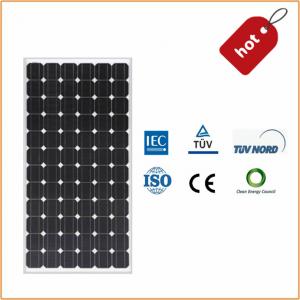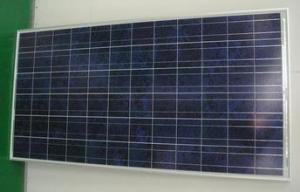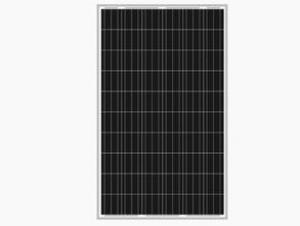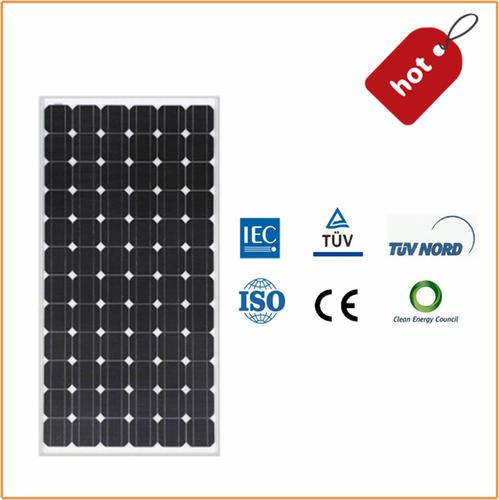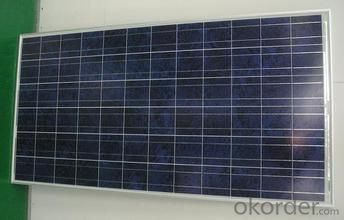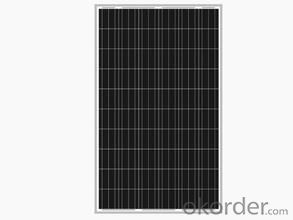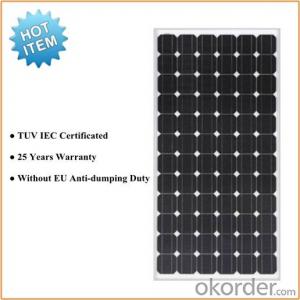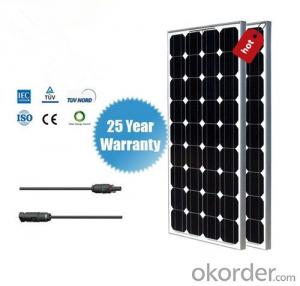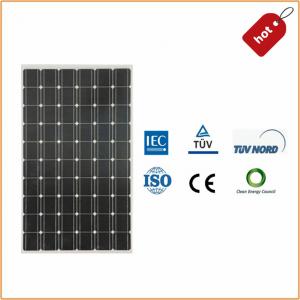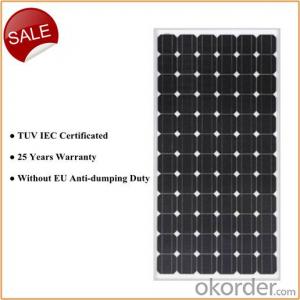Jinko Solar Panels Mono PV Solar Panel 280W with Solar Panel Certification TUV
- Loading Port:
- Ningbo
- Payment Terms:
- TT or LC
- Min Order Qty:
- -
- Supply Capability:
- 600MW Annual Year watt/month
OKorder Service Pledge
OKorder Financial Service
You Might Also Like
Prices for pv Solar Panels (280W Solar Module) with 280W Solar Panel Certification TUV
Mono 280w Panel Certificated with TUV,IEC,CEC,CE and so on.
Solar Panel Mechanical Characteristics
Cell Type | Mono Crystalline 156×156mm(6 inch) |
No. of Cells | 72(6×12) |
Dimension | 1956×992×50mm |
Weight | 23kg |
Solar Panel Component Element
Front Glass | 3.2mm, High Transmission, Low Iron, Tempered Glass |
Frame | Anodized Aluminum Alloy Type 6063-T5 |
Junction Box | IP 65 Rated (Black) |
Output Cables | TUV 1×4mm2, length:900mm |
Connector | MC4(UV resistance and self-locking/IP67) |
Encapsulation Material | EVA(0.50±0.03mm thickness) |
Back Foil | White TPT(0.32±0.03mm thickness) |
Fixing Adhesive | Silicone Sealant(White) |
Solar Panel Specifications
Module Type | 280M | ||||
Maximum Power at STC (Pmax) | 280Wp | ||||
Maximum Power Voltage (Vmp) | 36.20V | ||||
Maximum Power Current (Imp) | 7.74A | ||||
Open-circuit Voltage (Voc) | 43.4V | ||||
Short-circuit Current (Isc) | 8.27A | ||||
Module Efficiency (%) | 14.4% | ||||
Operating Temperature( °C ) | -40°C ~+90°C | ||||
Maximum System Voltage(V) | DC 1000V(TUV) / DC600V(UL) | ||||
Maximum Rated Current Series(A) | 15A | ||||
Power Tolerance | 0~+3% | ||||
Temperature Coefficients of Pmax | (-0.45±0.05)%/°C | ||||
Temperature Coefficients of Voc | (0.05±0.01) %/°C | ||||
Temperature Coefficients of Isc | (-0.35±0.02)%/°C | ||||
NOTC(°C ) | (47±2)°C | ||||
STC: Irradiance 1000W/M2 Module Temperature: 25°C AM=1.5
Solar Panel Warranty
Warranty | 10-year warranty on product material and processing technology |
Industry power output warranty: 90% in 12 years, 80% in 25 years |
Solar Panel Packing Configuration
Q’ty/Pallet, | 1×20’ft | 1×40’GP | 1×40’HQ |
Pallet Q’ty | 10pallets | 24pallets | 24pallets |
Q’ty/Container | 200pcs | 480pcs | 528pcs |
How the Solar Panel Works
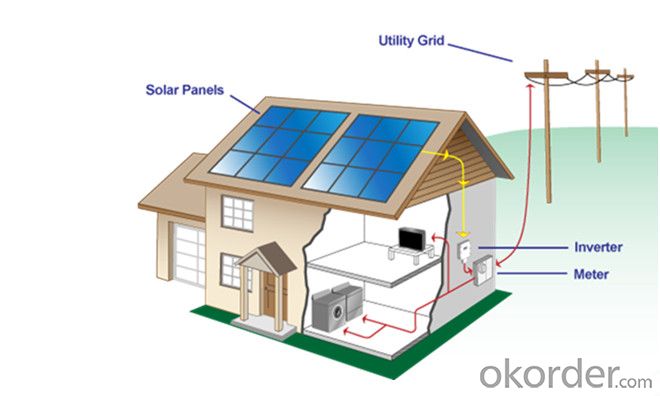
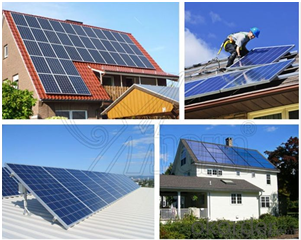
FAQ
I..Will you focus on the safety of the goods during transportation?
Yes, Safety of the cargo is the primary element that we would consider on transportation.
II..How would guarantee the quality will meet the requirements of your clients?
Before shipment, we will have inspection for each batch of goods.
III..What certificates do you have?
IEC,UL,TUV,CSA,etc.
IV..Can you do OEM according to clients’ requirements?
Yes, we have our own brand while we can provide OEM service
- Q: My hubby and I are waiting to move in to our camper but have to figure out how many solar panels, batteries, etc. to get. I can't find the info per appliance for Watts and amps, but does anyone have a good, general idea of how many Watts it'd take to run the whole shabang? It's a 999, 25-foot Sportsmen tag-a-long, if that helps..It's got the following, and we'd like to run the propane things off of electric:*Refrigerator/freezer*Microwave*Oven/stove*AC/Heat*Will have a tv, phone chargers, laptop charger, but those will be unplugged when not in useThanks so much! It's such a headache.. You get SO MUCH different info from different places.. OI..
- whenever i do my gf, i use up to 900 watts of power
- Q: How much would solar panels cost for: A Cell phoneA average houseA car
- They would cost quite a bit but the user would likely be eligible for some energy credits from the power company and their cell phone carrier which would bring down the costs
- Q: Can solar panels be used to power a military vehicle?
- Yes, solar panels can be used to power a military vehicle. Advances in technology have allowed for the development of lightweight and flexible solar panels that can be integrated into the structure of military vehicles. These solar panels can capture sunlight and convert it into electrical energy to power various systems and reduce reliance on traditional fuel sources. Implementing solar panels can enhance the sustainability and operational efficiency of military vehicles in certain scenarios.
- Q: I was trying to figure out if I could run an electric heater off of a solar panel, but I don't understand these electric convertion factors and stuff. Would it work? (I know it'll only work in the daytime and stuff.)SOLAR PANELPeak Power 95W PTC Watts 73.0WVoc 30.7VPeak Voltage 24.4VIsc 8.6APeak Current 7.96A HEATERInput: 20 V/60 Hz ,500 W/5,200 BTU
- the panel would have to be on for 0 hours in the sun to get an hours use with the set up. try researching solar hot water heaters. they are much more efficient. a cheap one would be painting an old hot water heater black and pipe it to the new hot water heater. it will save you 80% of your electric hot water bill.
- Q: We are thinking about useing solar panels for our house.Does anyone know about solar panels? If so could you please tell me some information on them,and the cost for a home,to install them.
- solar panels are device that convert sun energy into electric energy by physic and chemical effect.solar panels price is high,but you will save your late electricity bill,it is cost effictive.
- Q: Can solar panels be installed on desalination plants?
- Yes, solar panels can be installed on desalination plants. Solar energy can be harnessed to power the desalination process, reducing the reliance on traditional energy sources and making the plants more sustainable and environmentally friendly.
- Q: I need to prepare solar panels for using in home needs electricity purpose. Can anyone could help me to know much more about it.
- Unfortunately, okorder / You could make your own solar water heater, and poasibly save money that way. You could pay a professional to install solar panels for you, and it might actually save money in the long run, depending on where you live. But the up-front investment is usually on the order of $0,000.
- Q: How do solar panels affect the property's branding and marketing?
- Solar panels can positively impact a property's branding and marketing by showcasing its commitment to sustainability and environmental responsibility. By highlighting the use of clean and renewable energy sources, solar panels can attract environmentally conscious consumers and contribute to a positive brand image. Additionally, the reduced reliance on traditional energy sources can lead to cost savings, which can be highlighted in marketing materials and further enhance the property's attractiveness to potential customers.
- Q: I am planning to run a couple of dc motors on solar current. I have a couple of 450mA 4V, 200mA .5V, 00mA 9V solar panels with me. I need to run a pair of .5A 9V motors. Suggest me a circuit along with other equipments I might require. For your info, I am trying to build a solar powered drone / UAV
- I don't think it is enough solar power. Your motor requires .5A x 9V = 3.5 watts. The solar cells are .450A x 4V x 2ea. = 3.6 watts, .2A x .5V = .3 watts, .A x 9V = .9 watts total solar = 4.8 watts. The problem with connecting the cells in series to get the right voltage, like the two 4V cells in series with the .5 volt cell (total 9.5 volts) is that the .5 volt cell limits the maximum current to only 0.2A. If you paralleled that with the 9V cell, you would get 9 volts at 0.2 + 0. = 0.3A, too low to operate the motor at its design current and voltage. The best you could do is put the two 4V cells in series, and in parallel with the 9V cell (a blocking diode might be a good idea, but probably not required for such a small array). That way you get 8 volts at 0.55 amps.
- Q: I need to have more information about what are solar panels. will you help me?
- How photograph voltaic Cells artwork by using Scott Aldous interior this text a million. introduction to How photograph voltaic Cells artwork 2. Photovoltaic Cells: changing Photons to Electrons 3. How Silicon Makes a photograph voltaic cellular 4. Anatomy of a photograph voltaic cellular 5. power Loss in a photograph voltaic cellular 6. photograph voltaic-powering a house 7. fixing photograph voltaic-capacity themes 8. photograph voltaic-capacity experts and Cons 9. lots greater advice 0. See all actual technology articles you have in all probability considered calculators that have photograph voltaic cells -- calculators that never want batteries, and in specific circumstances do no longer even have an off button. as long as you have sufficient mild, they seem to artwork consistently. you're transforming into considered greater suitable photograph voltaic panels -- on emergency street indicators or call packing packing containers, on buoys, even in parking lots to capacity lights fixtures. whether those greater suitable panels are not so straight forward as photograph voltaic powered calculators, they are accessible, and not that stressful to discover in case you comprehend the place to look. There are photograph voltaic cellular arrays on satellites, the place they are used to capacity the electrical powered systems. you have in all probability additionally been listening to with regards to the photograph voltaic revolution for the final 20 years -- the theory at some point we are able to all use unfastened electricity from the solar. it somewhat is a seductive promise: On a dazzling, sunny day, the solar shines approximately a million,000 watts of power according to sq. meter of the planet's floor, and if we could collect all of that power we could unquestionably capacity our homes and workplaces for unfastened.
Send your message to us
Jinko Solar Panels Mono PV Solar Panel 280W with Solar Panel Certification TUV
- Loading Port:
- Ningbo
- Payment Terms:
- TT or LC
- Min Order Qty:
- -
- Supply Capability:
- 600MW Annual Year watt/month
OKorder Service Pledge
OKorder Financial Service
Similar products
Hot products
Hot Searches
Related keywords
